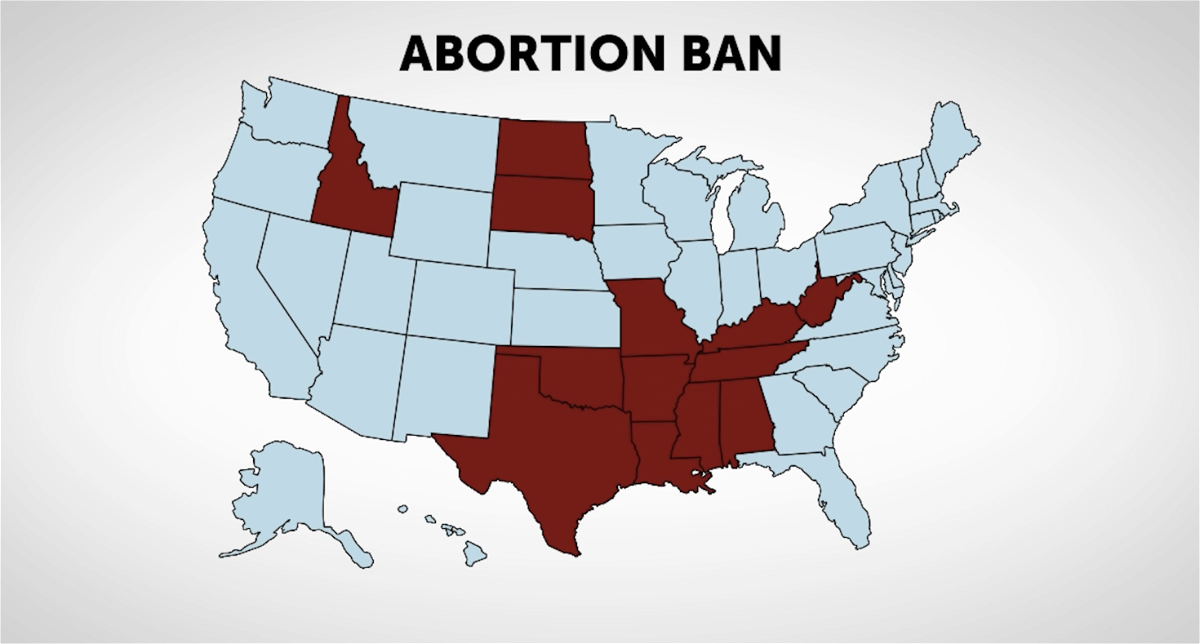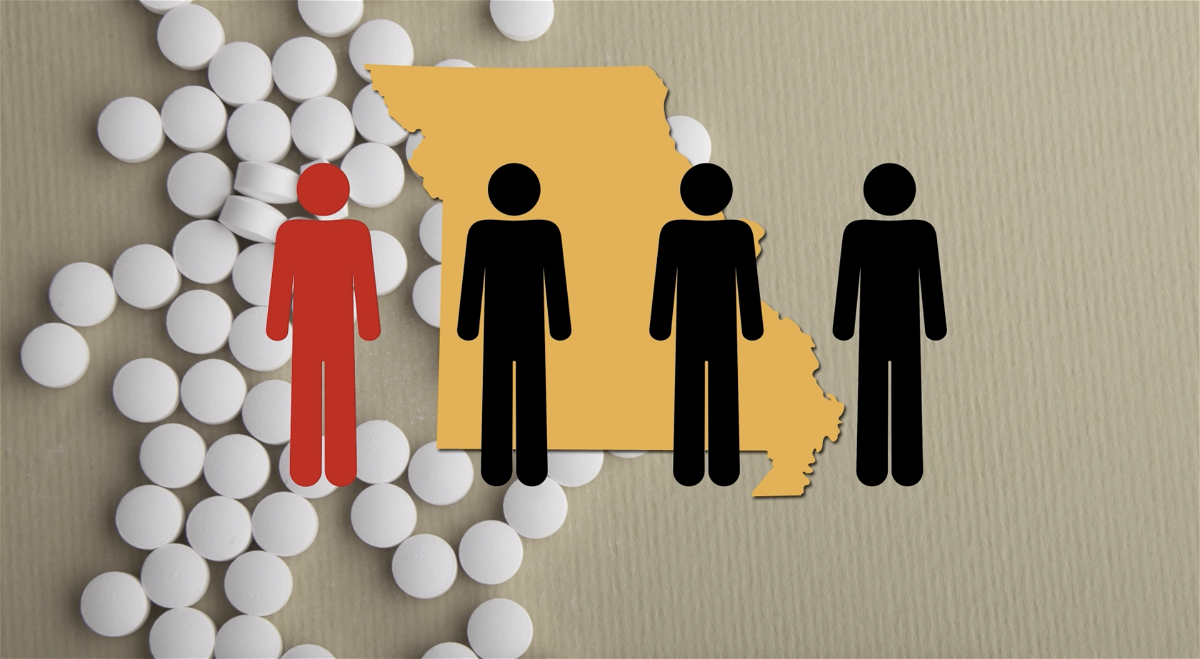How Missouri’s full abortion ban reverberates a year after Roe was overturned
COLUMBIA, Mo. (KMIZ)
One year ago, Missouri was the first state to ban abortions when Roe v. Wade was overturned on June 24, 2022.
Roe v. Wade, the precedent that allowed abortion nationwide was overturned in the 5-4 Dobbs v. Jackson decision last year. Then-attorney general, now U.S. senator, Eric Schmitt implemented the state's trigger laws. That along with a proclamation from the governor triggered a state ban on abortions except for "in cases of medical emergency" that lawmakers passed in 2019. The ban was written to go into effect after a decision overturning the precedent.
One-in-five American women will have an abortion, according to the Ohio Policy Evaluation Network. In Missouri, abortions were decreasing long before the trigger law went into effect. In 2021, the last full year of legal abortion in Missouri, 3,693 residents received abortions.
That's because of years of lawmakers chipping away at abortion rights, creating more hurdles to getting abortions across the state even while the procedure remained legal.
“In some ways, Missouri was living in a post-Roe world, even while Roe v Wade was still the law of the land," Emily Wales, president and CEO of Planned Parenthood Great Plans, said.
However, not all of abortions for Missouri residents were performed in the state and that number may not be entirely accurate. According to the Department of Health and Senior Services, "this change is difficult to interpret as thousands of Missouri women obtain abortions in states that do not provide Missouri with individual abortion records."
Looking across the country, there were 25,000 fewer abortions than expected in the nine months following the Dobbs v. Jackson ruling. That comes from a combination of 81,000 fewer abortion in states with bans or six-week bans and 56,000 more abortions in states where abortion remained legal, according to data from the Ohio Evaluation Network.

Planned Parenthood Great Plains covers western Missouri, Kansas, Arkansas and Oklahoma. In those four states, Kansas is the only one that still allows abortions.
“Even though abortion already wasn’t available here, we had an infrastructure of abortion providers that’s really strained," Wales said. "There were so few abortion providers, especially in the Midwest and South, that when you had whole states lose access, the system became really strained.”
Despite the change in regulations one year ago, those for and against access to abortion are still working the same as they were before. Bonnie Lee with 40 Days for Life said her work did not end with overturning Roe v. Wade.
"One year later, we are still working with crisis pregnancy centers," Lee said. "Our sidewalk advocates are on the sidewalk offering resources to moms who are pregnant, and prayer warriors are still on the sidewalk praying because abortions are still happening. It's just that we're thankful that it is not occurring in Missouri."
Changes to healthcare institutions
Since the Dobbs decision, medical school applications decreased by 5% for OBGYN specialties, according to research from Dr. Jody Steinauer with the University of California in San Francisco. In states where abortion is banned, that decrease is closer to 10%.
But a University of Missouri Health Care spokesperson said the ruling didn't change anything for that organization.
"The ruling doesn’t affect MU Health Care because we do not provide abortions and would only provide a procedure if the life of the mother was at risk and it was a medical emergency," an MU Health spokesperson said in an email to ABC 17 News.
Several other local hospitals declined or ignored inquiries.
SSM St. Mary's Hospital in Jefferson City said its policies are based on legal, ethical and religious standards.
“We continue to respect the diverse individual needs of every person we serve and work to ensure they receive the best care possible. In tragic situations when the mother suffers from an urgent, life-threatening condition during pregnancy, our practice has always been to provide all medically-indicated treatment, even if it poses a threat to the unborn child," a statement from the hospital reads.
Birth control access
One-in-four Missourians do not know that birth control is still legal in Missouri, according to a survey from Missouri Family Health Council.

Michelle Trupiano said that misunderstanding of Missouri's reproductive care laws is part of the reason the Missouri Family Health Council started a free birth control program. Since the program started, Trupiano said it's sent out over 2,000 kits.
“All forms of contraception are legal in the state of Missouri," Trupiano said. "However, we know that patients are confused about that.”
Trupiano said she's worried there will be attempts to make certain forms of birth control legal, like some bills introduced over this past year's legislative session.
“Here in Missouri, we have seen different attempts to classify certain methods of contraception as an abortifacient and ban them from our Medicaid program," Trupiano said. "And that is just the beginning.”
National efforts
At the federal level, Democrats in Congress are pushing bills to guarantee the right to abortion in every state. Missouri's senior Sen. Josh Hawley (R) is decidedly against the effort.
“I'm completely against the Democrats' effort here to impose a radical abortion law on the entire nation. It would repeal all of our laws in Missouri," Hawley said.
Senate Democrats plan to ask for a vote on the bills Saturday, the anniversary of the Dobbs decision.
“I'm 100% pro-life, but I absolutely support voters being able to make up their minds on this issue," Hawley said.
Abortion on the ballot
A group is pushing for Missourians to vote on whether to legalize abortion.
An initiative petition aims to codify abortion rights in the Missouri Constitution. There are 11 total rights it outlines, including access to abortion, birth control and miscarriage management. The petition also outlines parameters for each of those 11 rights.
Certification of the constitutional amendment question has been stalled because of a disagreement between Attorney General Andrew Bailey and State Auditor Scott Fitzpatrick on how much it would cost to restore some abortion access.
Cole County Circuit Judge Jon Beteem ruled the attorney general must approve the fiscal note on a proposed initiative petition within 24 hours, allowing the petition to move forward, but Bailey missed that deadline Wednesday.
Bailey's office filed an appeal on that decision Thursday with the Missouri Supreme Court.
“Missouri was the first state to end elective abortion a mere six minutes after the Court’s decision in Dobbs, and we’ve worked diligently since then to protect the unborn. From getting Walgreens to back off of shipping unsafe, abortion-inducing drugs illegally in the mail to defending our pro-life law against abortion activists in court, we’re just getting started," Bailey said in a statement sent to ABC 17 News.
The next step is for Secretary of State Jay Ashcroft to certify the petition, then the group can start collecting signatures. However, Ashcroft is not a fan of the initiative petition.
“As an elected official and secretary of state, I've got to follow the law and there are initiative petitions filed that I agree with and initiative petitions filed that I disagree with," Ashcroft said. "But the law is clear about what my duties are.”
Ashcroft played a part in enacting the trigger laws to ban abortion in Missouri one year ago.
“The best thing about that is not only are we able now to really protect both born and unborn in Missouri, but we can quit fighting about that and we can take all the effort that we used to use fighting for that to say, how can we do a better job for those moms, for those women that sometimes are gone?” Ashcroft said.
